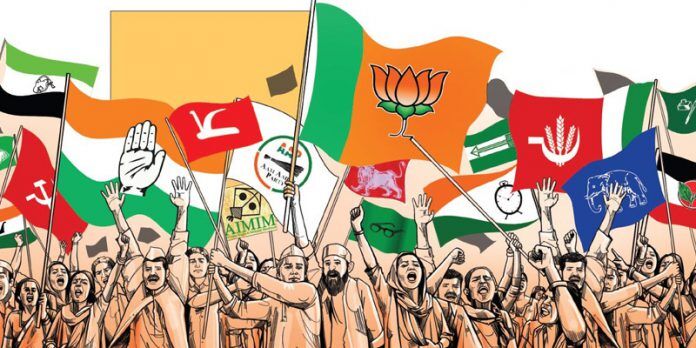Plagued with aberrations
In transitioning from serving people through dedicated cadres to acting on whims of corporate fundraisers, market-driven political parties are mocking Indian democracy

Apparently, political parties were not considered seriously while drafting the Constitution of India. But today, they are everything to society, the state, and the market. All the three forces — the state, society, and the market — are integrally connected with each other through their functions. They will have to interact with each other in harmony to serve society. People should be the ultimate beneficiaries. The three forces have to be on the track of evolution through constant introspection and reforms. It requires constant vigilance on the part of all stakeholders. People, as citizens, have to watch and assess the performance of the state and, equally, as rational consumers, decide their right choice in the market.
What is going on in India, especially in the political system, has to be seen in a larger perspective, and action has to be initiated urgently to keep the democracy in order. The recent episodes in the AIADMK party in Tamil Nadu and yet another in Maharashtra are not internal matters of the respective parties. They have larger political implications. These developments should not be looked at through a tunneled vision. Essentially, political parties are public institutions serving the public through their political activities. Political parties contest elections and, if they win, they capture power. Hence, they should be treated as public institutions. Every action of a political party has to be viewed from the perspective of the general health of politics and political system. If we allow political parties to violate their own statutes, the general political system will be negatively impacted. Parties are not just linked to their members; they work with the people. These are not properties of individuals, families, or caste groups, but rather public institutions. In India, however, these have been treated as family and individual properties. This is the reason parties are being shaped in a manner that individuals and certain families become indispensable to these. This syndrome has been developing over a period of time due to lack of strict scrutiny by competent authorities including the Election Commission of India and the judiciary.
Political parties represent people. As long as they collect money from people and party members, their relationship with party cadres and people remains closer, party members are valued, and people are respected. Today, political parties have started getting huge amounts of money from corporates and other donors. They have slowly moved away from their party members and started changing the relationship as a client-based pattern. With the money they get from the corporates, the parties have started paying their members for all political activities. Prior to this, all members were voluntary party workers, and carried out the activities with a sense of commitment and sincerity due to their connection with the party and its leaders. But now all the activities of the party are done on a cost basis. Now it is a money-earning work instead of serving the party. Also, the above practice has been extended to the purchasing of voters. Nowadays, ideological discourses are very rare in party activities. Parties are being viewed by their respective members as vehicles to achieve prosperity and power. Thus, service has taken a backseat. Out and out, it has become an opportunity to make money through power.
When the economy grows, the volume of money transactions is huge, and the opportunity to get money through rent-seeking is also high. As a result, corruption has been normalised and regularised, and it is no longer a serious issue for anyone. Only socially conscious citizens view it as a disease. Since money is a determining factor in getting the seat, winning election, and getting a berth in the ministry, crossing over to parties by the elected representative is not a serious issue anymore. In a representative democracy, these are all aberrations and detrimental activities. Yet, these have not drawn adequate attention from public intellectuals.
Since market money plays a dominant role, parties are shaped under the leadership of a group of individuals who would play active roles in keeping the party in their hands, and for which they can purchase members of legislative assembly, the Parliament, executive council etc. Economic benefits determine the loyalty of the individuals.
Against this background, the Election Commission of India and the judiciary have to work firmly to cleanse the functioning of political parties — both during elections and internal activities. It is a truism that our democracy has been reduced to electoral participation and yet the electoral participation has been afflicted with a series of ills that have been undermining the value of democracy. In two areas, the Election Commission of India and the judiciary have to concentrate their attention — on the functioning of the parties and their participation in the electoral process. The real value of checks and balances will be realized only when the two functions of the parties are sensitized by the Election Commission and the judiciary. If both functions of the political parties are allowed freely without strict scrutiny, political parties, party cadres, and even the public can be purchased by a company through its money. Buying and selling have become the order of the day in politics. It started with the purchase of voters, MLAs, and MPs, and now it has been extended to the purchase of the executive council members and general body members. The media has to generate discourse on electoral and party reforms expeditiously with the active participation of public intellectuals, researchers and academicians. In want of such interventions, political parties through their market-driven activities will make a mockery of democracy. The party system has come to its lowest ebb and it needs a jolt and reform.
The writer is a former Professor and Rajiv Gandhi Chair for Panchayati Raj Studies, Gandhigram Rural Institute. Views expressed are personal



